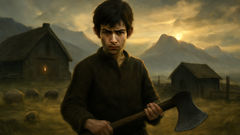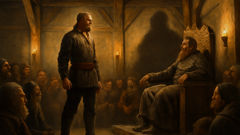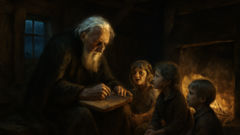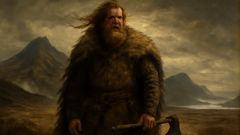Introduction
A biting wind swept across the volcanic plains of Iceland, tugging at the long grass and sending flurries of ash swirling into the gray dawn. Here, where jagged peaks shouldered against the northern sky and fjords carved deep into the land, the world felt young and raw—a place of promise and peril in equal measure. In this wild landscape, the hearth-fires of settlers flickered bravely, their warmth defiant against the encroaching cold. Among these hardy folk, stories traveled farther and lasted longer than men, echoing from farmstead to farmstead, growing with every telling. Yet, none blazed brighter or more fiercely than the saga of Egil Skallagrimsson—a man of daunting presence and legendary contradiction. Egil was born under a troubled sky, the second son of Skallagrim, a chieftain who carved his own fortune out of the black rock and wild rivers. From his earliest days, Egil was marked as different. His brow furrowed with thought while other children played, and his hands, quick to seize a sword, just as easily picked up the rough-hewn harp. The boy’s ferocity was matched only by his insatiable greed—yet within him, too, burned a genius for poetry that could move even the stoniest heart. Tales of Egil’s unruly youth were whispered at every hearth: of a child who wrestled grown men into the turf, a young poet whose biting verses cut deeper than any blade, and a farmer whose ambition outgrew even the richest pastures. As he grew, Egil’s name became a byword for both terror and wit—a man who could outfight the mightiest berserkers and outthink the shrewdest chieftains. His life would span decades of shifting alliances, feuds, betrayals, and sudden violence, but also moments of stark beauty and unexpected tenderness. Through Egil’s eyes, the saga unfolds: the ceaseless struggle for land and legacy, the clash of kin and kings, and the forging of Iceland’s early identity in blood, gold, and song. From the glimmering halls of Norway to the wind-beaten fields of Borg, Egil’s story is one of endurance—of a man forever striving, driven by hunger for both wealth and meaning. The saga endures not because Egil was flawless, but because his flaws were writ large across the landscape he called home. Through winter storms and summer raids, his tale survives, braided into the very fabric of Iceland itself.
Roots in Shadow: The Making of a Warrior
Egil Skallagrimsson’s story began long before he could lift a sword or compose a verse. Born to Skallagrim, himself the son of Kveldulf—a man rumored to possess the wolf’s rage—Egil inherited a legacy both proud and perilous. The Skallagrim clan had left Norway under a cloud of royal suspicion, fleeing King Harald Fairhair’s tightening grip to settle on the edge of the world. Here, in the rough-hewn longhouse of Borg, Egil entered the world with a cry that startled ravens from the roof.

From infancy, Egil seemed carved from grimmer stuff than other children. His hair was black as volcanic ash, his eyes fierce and unblinking, his temper quick to flare. His mother, Bera, tried to temper him with tales and lullabies, but Egil favored the clang of shield against shield, and the stories of ancient heroes who defied kings and gods alike.
At the age of three, Egil composed his first poem—a biting verse mocking a neighbor’s stinginess, which left grown men in uneasy laughter. By seven, he bested boys twice his size in wrestling matches, while his father watched with a mixture of pride and apprehension. Skallagrim saw in his son the old wolf’s spirit, but also the seeds of trouble.
Trouble, indeed, would find Egil quickly. At twelve, during a feast held at Yule, a drunken challenge between children turned deadly serious. Egil’s older cousin, Grim, taunted him with insults, and Egil’s patience snapped. He seized an axe and struck Grim down, sending the household into chaos. Skallagrim responded not with wrath, but with grim acceptance—after all, blood ran hot in their line. Yet, this act branded Egil as dangerous even among his kin.
Word of Egil’s ferocity traveled far beyond Borg. Chieftains eyed the boy warily, seeing in him both a threat and a potential ally. When the family was drawn into feuds with neighboring clans over grazing rights and stolen cattle, Egil was at the forefront. He fought with a berserker’s abandon, heedless of wounds. Yet, his violence was not mindless—Egil was cunning, quick to spot weakness in an enemy’s ranks or turn an insult to his advantage.
Still, for all his strength and bloodlust, Egil was restless. At night, he wandered the lava fields, composing verses to the cold stars. His poetry—sharp-edged and unsparing—was as much a weapon as his axe. He mocked rivals in rhyme, shamed cowards with stanzas, and wooed women with bittersweet sagas of loss and longing. In the harsh Icelandic world, where words mattered almost as much as steel, Egil’s tongue could win him victories no blade could secure.
One early autumn, as the sheep descended from the high pastures, Egil’s father called a council of their household. Skallagrim spoke of a distant kinship in Norway—a chance to recover lost honor and perhaps claim new wealth. Egil, eager for adventure and spoils, pressed to go. Skallagrim hesitated, knowing the dangers that lurked across the sea: old enemies, treacherous kings, and the bitter cold of royal courts. But Egil was relentless, and soon the decision was made.
The voyage to Norway was fraught with peril. Bitter storms battered their knorr, and hungry waves threatened to swallow them whole. Egil stood unbowed at the prow, singing defiant verses to the wind while others huddled in fear. They landed at last on the stony coast of Trøndelag, where King Erik Bloodaxe ruled with an iron fist. Egil’s reputation had preceded him; some welcomed the Icelanders as kin, while others whispered of omens and ill luck.
Egil’s time in Norway would prove a crucible. He found himself at odds with the king’s men almost from the start. In the mead halls, he traded insults with royal favorites, answering their boasts with stinging poems. When provoked, he fought with savage joy, earning both enemies and grudging respect. Yet, Egil’s ambition burned hotter than ever. He schemed for treasure and favor, even as he plotted vengeance against those who slighted him. In Norway’s shadowy courts, Egil learned the harsh calculus of power—that loyalty was fleeting, alliances brittle, and a sharp tongue could be as deadly as any sword.
Of Kings and Kin: Feuds on Foreign Shores
Norway in the age of Egil was a land torn by ambition. King Erik Bloodaxe ruled with a merciless hand, rewarding his loyalists and crushing dissent. Into this fraught court strode Egil Skallagrimsson—a foreigner with a fearsome reputation, a thirst for gold, and a talent for stirring up trouble.

From the moment he arrived, Egil clashed with Erik’s circle. Arinbjorn, a wealthy chieftain and distant kin to Egil, offered protection and hospitality; but even this bond could not shield Egil from the dangers of court intrigue. The king’s wife, Queen Gunnhild, saw in Egil a threat to her family’s power. She whispered poison in Erik’s ear and set spies to watch Egil’s every move.
It wasn’t long before tempers flared. During a royal feast, Egil traded barbed verses with Bard, a favored courtier. The insult stung, and Bard challenged Egil to a duel at dawn. The field was slick with dew when the two men met, swords flashing in the pale light. Bard fought with pride, but Egil fought with fury; his blade found its mark, and Bard fell. This killing could not go unanswered. Erik ordered Egil’s arrest, but Arinbjorn intervened, pleading for mercy and reminding the king of old ties to Iceland.
A tense truce followed, but Egil’s enemies multiplied. He survived assassination attempts, poisonings, and ambushes on lonely roads. Through it all, Egil responded not with fear, but with scornful poetry and ever-bolder deeds. He raided villages on the Norwegian coast, wresting wealth from Erik’s supporters and distributing it among his allies. The king’s wrath grew, and the price on Egil’s head swelled.
Despite these dangers, Egil forged friendships as fierce as his hatreds. Arinbjorn became his closest companion—brave in battle, loyal to the bone, and skilled in navigating royal politics. Together, they waged a private war against the king’s men, raiding outposts and seizing ships. Yet, Egil was not immune to loss. During a skirmish on a narrow fjord, his beloved brother Thorolf fell to an enemy spear. Grief nearly crushed Egil; for days, he spoke only in verse, his poems laden with sorrow and vengeance.
The feud with Erik escalated. When Egil defied a royal decree to pay tribute, Erik ordered his execution. On a cold dawn, Egil was seized and led to the gallows. As the noose tightened, he demanded a final request: to recite a poem in his own defense. The court fell silent as Egil composed, line by line, a verse so moving that even Erik’s heart softened. The poem’s words shimmered with sorrow, pride, and a raw plea for mercy—reminding the king that honor could be found even among enemies. Erik relented, banishing Egil instead of killing him.
Egil’s reputation soared. Across Norway and Iceland, word spread of the poet who had sung himself free from death. Yet, exile brought only fresh challenges. Egil joined Viking bands raiding along the Baltic, his name striking terror into the hearts of merchants and nobles alike. He amassed a fortune in silver and plunder, stowing it in secret hoards across the north. But no matter how much gold he gathered, it never sated his hunger—for vengeance, for recognition, for a place in the saga that would outlive even the oldest stones.
Meanwhile, Egil’s family in Iceland faced their own perils. Skallagrim grew old and wary, defending his lands against jealous neighbors. When word reached Egil that his father lay dying, he braved the dangerous voyage home—facing storms at sea and ambushes ashore. He arrived just in time to say farewell. Skallagrim’s last words were both a blessing and a warning: “You are my true son—never forget that strength without wisdom is a curse.” Egil wept openly for the first time in years.
Back in Iceland, Egil found that wealth brought as many enemies as friends. Rival chieftains coveted his silver, while old feuds simmered just beneath the surface. Yet, Egil refused to yield an inch of land or reputation. He rebuilt his farmstead into a fortress, surrounded himself with loyal kin, and used his poetry to shame those who challenged him. His verses became a shield, as much a defense as his sword or axe.
Still, for all his bluster and greed, Egil was not without compassion. He offered sanctuary to those cast out by other chieftains—men broken by feuds, women widowed by violence, children orphaned by the endless cycle of revenge. In their stories, Egil saw echoes of his own struggles: the longing for security, the price of pride, the impossibility of escaping one’s own legend.
The Long Twilight: Greed, Legacy, and Poetic Reckoning
As years passed, Egil’s ferocity did not wane, but it deepened—like a river cutting ever deeper into stone. His fame had become legend across Iceland and the northern world. Yet, within his household at Borg, age began to weigh upon him. The fiery youth who had wrestled men and sung himself free from death now felt the ache of old wounds and sorrows that silver could not mend.

His greed, always a defining force, grew sharper in old age. Egil amassed hoards of gold and silver from years of raiding and tribute. He buried some beneath stones marked only by cryptic verses; others he hid in secret caches known only to himself and trusted kin. This wealth was both shield and curse—safeguarding his family against famine and feud, but also stoking jealousy and fear among neighbors. Chieftains schemed to uncover Egil’s treasures or undermine his influence, while his own sons and daughters wondered what legacy they would inherit.
Despite his growing isolation, Egil remained a force to be reckoned with. When disputes arose over grazing lands or inheritance rights, he faced rivals in the Althing—the great assembly of Iceland—with words as sharp as any blade. His poetry could flay a man’s reputation, or elevate a friend to glory. Egil’s saga became the saga of Iceland itself: a record of shifting alliances, sudden betrayals, and hard-won moments of peace.
Yet, even a man as formidable as Egil could not escape tragedy. His beloved son Bodvar drowned during a storm at sea, leaving Egil shattered by grief. For days, he neither ate nor spoke, wandering the fields in a daze. It was poetry that finally saved him. In the darkness of his mourning, Egil composed a lament—the Sonatorrek—a poem so raw and honest that it became a touchstone for generations. Through verse, Egil confronted not only his sorrow but the limits of strength and the reality of loss.
In time, Egil’s anger cooled into wisdom. He became a sought-after advisor in the Althing, respected for his insight as much as his might. Younger generations listened to his tales and verses, learning that perseverance meant more than brute force or cunning; it meant enduring heartbreak, learning from defeat, and forging meaning from suffering.
In his final years, Egil’s vision dimmed and his step slowed, but his mind remained sharp. Surrounded by grandchildren and followers, he recited the tales of his youth—the battles won and lost, the treasures gained and squandered, the friends and enemies who had shaped his life. He taught that a man’s true legacy was not gold or renown, but the stories told in his name.
When Egil died, he was buried with simple honors in the land he had defended so fiercely. His hoards became legend, but it was his poetry and perseverance that endured. Long after his bones had turned to dust, his verses echoed from farmstead to farmstead—reminding Icelanders that even the fiercest warriors are shaped by both shadow and song.
Conclusion
Egil Skallagrimsson’s legend remains woven into the fabric of Icelandic heritage—a saga of ferocity and greed, but also of artistry and resilience. His life was a testament to the unyielding spirit that shaped Iceland: a land forged by fire and ice, where survival demanded both strength and cunning. Yet, beyond the bloodshed and the battles, it was Egil’s poetry—the raw lament of loss, the biting wit of satire, and the stubborn hope of perseverance—that endures through centuries. His verses became the conscience of a people who understood that even in a harsh world, beauty and meaning can be drawn from pain. In every echoing stanza and storied field, Egil’s saga reminds us that greatness is never simple; it is carved from contradiction, driven by flaws as much as by virtues. As long as Iceland’s winds howl over its plains and fjords shimmer beneath midnight sun, the story of Egil—warrior, farmer, poet—lives on.













